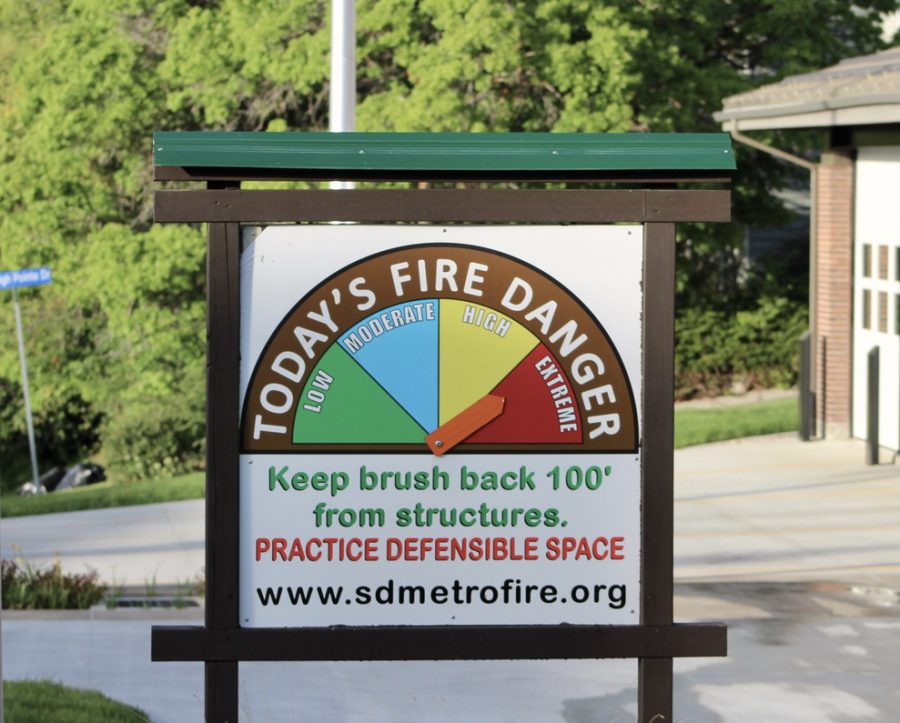Shadley: Masks Protect Us From Poor Air Quality, but Will Utahns Wear Them?
A sign reported fire danger levels near Mueller Park Canyon in Bountiful, Utah on Friday, May 21, 2021. (Photo by Brooklyn Critchley | The Daily Utah Chronicle)
May 25, 2021
The CDC recently announced that fully vaccinated people no longer need to wear masks in most settings. While we can debate whether this announcement came too soon, the prevalence of masks will likely decrease over the next few months as we return to “normalcy.”
As the pandemic slows down, we’re approaching another season in Utah that poses dangers to public health: wildfire season. 2020 had a record-breaking fire season and we have every reason to believe that this season will be just as bad, if not worse, due to climate change causing warmer temperatures in Utah.
With an increase in wildfire frequency and intensity comes an increase in air pollution that can lead to heart, lung and other health complications. While reducing wildfires should be a goal of our state and federal government, dangerous air quality days are an inevitability of life in Utah in summer and winter. One tool, that we’ve become all too familiar with this past year and a half that could mitigate the health complications that come with air pollution for some, are N95 masks.
Salt Lake City already experiences some of the worst air quality in the country and it’s only going to get worse with climate change. We need to recognize that N95 masks, while many have viewed them as a nuisance over the past year, can be effective against the harmful effects of poor air quality moving forward. However, the political stigmatization and the culture around masks in Utah could lead to wildly different health outcomes based purely on political affiliation.
The Danger of Wildfire Smoke
Wildfires bring with them Particulate Matter 2.5, or PM2.5, which are particles two and a half microns wide or smaller — 30 times smaller than the width of human hair. These incredibly small particles can easily enter our lungs and bloodstream. Our air quality gets so bad that we, on certain occasions, recommend keeping schoolchildren inside during recess because it’s dangerous for them to spend any time outside. Even before our kids get in the classroom, air pollution can have a negative effect on them with increased exposure linked to increased risk of miscarriage and autism.
This summer, like nearly every summer in recent memory, is likely to bring an intense fire season as much of the American West continues to experience a drought, priming vegetation to be quick fuel for wildfires. Not only will it be an intense wildfire season, but it’s likely to be a longer one. University of Utah researchers recently found that the average air quality in August has worsened, and it looks like it might continue to worsen into September. With these additional wildfires creating even more PM2.5, we can expect worse air quality this summer.
Masks and Wildfires
During the pandemic, masks allowed us to engage in the same behaviors as before, like going to the grocery store or class, without exposing ourselves to much risk. While masks were most necessary indoors during the pandemic, masks will obviously be most helpful outdoors during wildfire season.
An unforeseen benefit of increasing all of the ventilation systems in buildings to combat COVID-19 is that improved HVAC systems can filter out harmful particulates brought in by wildfire smoke. These upgrades will be useful at filtering out bad air as our wintertime air pollution also comes in the form of PM2.5.
Like the virus, the most effective way to prevent wildfire smoke health effects is to stay indoors in a room that’s sealed off from outdoor smoke. However, as days with poor air quality become more common in Utah, we’ll have to venture out to the grocery store, school or work and go about our lives. In those situations, the CDC recommends using N95 or P100 respirators to filter out dangerous particulate.
Masks, for multiple reasons, have become emblematic of political affiliation in the United States. Back in August of 2020, 92% of Democrats said they had worn a face covering when in stores or other businesses during the month prior opposed to 76% of Republicans.
With wildfire smoke inhalation there would not be any mask mandates, only recommendations. Yet, I worry that the lasting effects of mask aversion in Salt Lake City will lead to many in that group abstaining from using masks as an effective protection measure. At the same time, people who previously may have been unaware of how useful masks can be at filtering air may be more likely to wear masks during poor air quality days, and they’ll be avoiding negative health outcomes because of it.
Wildfire smoke and the poor air quality that comes with it will continue to worsen this fire season and every fire season in the future. Masks, and N95 masks, in particular, are one of the easiest, effective ways to decrease the amount of smoke we inhale as we venture outside this summer.
If the political stigmatization of masks continues into this new, voluntary era of masking, we’re likely to see health disparities between those who identify as Republicans and those who do not. With roughly half of all Utahns registered as Republican, failure to embrace masks as an effective tool for minimizing wildfire smoke could lead to serious health complications for a majority of the state.










Michael Ross • May 25, 2021 at 8:13 pm
I strongly recommend that all who do not already have N95 respirators go to https://shop.projectn95.org and buy N95 respirators. They are a non-profit and do not make any money off your purchase. They thoroughly vet all sources. In fact at this point, they get nearly all products directly from the manufacturer. I am not affiliated with the organization. They are the only source I know of that you can truly rely on for getting N95 respirators that are not counterfeit. If I were you, I would not trust any other source offering N95 respirators that are not counterfeit or fraudulent. Keep in mind N95 respirators are single-use items. Do not reuse N95 respirators. Please plan your purchase quantity accordingly.
All frontline workers (including medical professionals), I strongly recommend that you go to https://shop.projectn95.org/ , register as a frontline worker, and buy as many surgical N95 respirators as you need to avoid respirator reuse and comply with pre-pandemic OSHA and infection control regulations, policies, and standards, including a new surgical N95 respirator per patient.